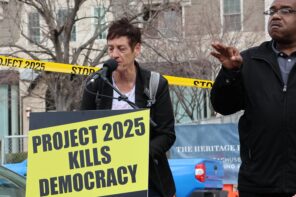Would it further compromise the strength of a weak economy to let the Bush tax cuts for the wealthiest expire? That is exactly what we are hearing from Republicans and from a few conservative Democrats as the January 1 date for expiration draws closer. Taking the misleading line that the long-awaited expiration of the partial tax holiday enjoyed by the top 2% of households amounts to an intolerable new tax hike, Utah’s Senator Orrin Hatch lashes out at expiration as a “job killer.” Already the handicappers are giving odds on how much the White House will end up conceding to the braying anti-tax forces.
This looming fight offers a tremendous teachable moment for public ethics if President Obama would only seize it and lead us into a national conversation on the subject of wealth and taxes. Such a conversation could be filled with implicit theological content, inasmuch as what I like to call “good religion” has a big stake moderating extreme wealth for the sake of commonwealth principles.
Certainly there is no shortage of bad religion—and bad history—hovering around the no tax or low tax mentality. When Chief Justice John Marshall described the power to tax as “the power to destroy” in 1819 he was actually quoting Daniel Webster and upholding federal supremacy against states that were then attempting to tax the Bank of the United States out of existence.
But anti-tax conservatives blithely ignore the historical context and still recite the Marshall mantra as they go to bed. They raise their children up to think of all taxation as a vicious incubus. Thanks to the oracles of conservative demigods like Friedrich Hayek and Milton Friedman, their anti-tax credo can even claim to be grounded in a kind of sacred scripture. Above all, they love to cling to that delicious phrase, “the power to destroy.”
But what if the power to tax were viewed instead as the power to create? What if it were viewed as an tremendous power for good in a culture in which the poor and relatively powerless have mostly been abandoned (and in which the wealthiest increasingly absent themselves from any kind of conversation about national priorities, in part because they no longer have to foot the bill)?
If ending the Bush tax cuts—cuts that were deemed reckless when they were first pushed through in 2001 and 2003—amounts to taking the punch bowl away from the very wealthy, then maybe some measure of sobriety is exactly what we need. There was and is, after all, an element of drunken irresponsibility involved in letting US millionaires sidestep realistic taxation during a time when we’ve been fighting two major wars and watching the economy and basic public services tank. I cannot help observing in this regard that the biblical prophets often used the imagery of drunkenness to evoke a society that oppresses its poorest while the wealthy bask in every luxury.
It may not be quite necessary for Obama to follow Amos in upbraiding the filthy rich as “cows of Bashan”—much as I would welcome some prophetic indignation in Obama’s mouth. All he needs to do is present a compelling narrative about how progressive taxation came into being and how it remains an essential tool in maintaining a national purpose and a sense of unity. He could weave in some helpful teaching about the estate tax as well.
If he did this he would surely find a receptive audience among everyday folks who routinely pay more (in taxes) and suffer more (in lost services) on account of the deference and the kid-glove treatment we give to the rich. He could bring into focus some basic information that hasn’t really surfaced in mass media coverage of the issue; such as the fact that we now pay the lowest amount in tax as a share of our personal income (17%) than we have at any time since 1971. It goes without saying that he could and should emphasize that taxes will not be going up for any but the very wealthiest—that cuts affecting working and middle-class families will be extended.
As for the “job killer” rhetoric of Sen. Hatch and the rest, the president could actually have some fun poking holes in the fantastical idea that handing rich and powerful people still more money means they will dutifully make productive, job-creating investments in the domestic economy. There has never been a shred of evidence to support this supply-side shibboleth, whereas no one disputes that restoring tax rates for the wealthiest to where they were before Bush messed with them would yield at least $2 trillion in badly-needed revenue over the course of 10 years.
A couple of months back, responding to a New York Times report, I lamented how the economic recovery appears to be faltering because the rich are disinclined to spend—and I deplored how spending by the rich now commands such a disproportionate share of all consumer spending. Now the financial pages are filled with reports on how US corporations are sitting on mountains of cash while refusing to hire new workers or even restore laid-off workers to company payrolls.
Back when we had a bit more clarity and courage about these matters, progressives would have called this situation by its right name: a capital strike. Today, progressives have grown wary about using language like that—they think it’s too provocative and too Marxist-sounding—whereas conservative bloviators like Charles Krauthammer and Amity Schlaes openly celebrate the anti-Obama strike and call it by its right name.
So Sen. Hatch wants to talk about job killing taxation? President Obama should egg him on and then slam him to the mat with the sickening reality of the current capital strike. The hardworking and hard-pressed folks sitting up in the cheap seats would cheer him on—and maybe even think about voting for him again, and voting for Democrats this fall.
One little problem with this scenario: Obama has surrounded himself with once-and-future high-income individuals who are themselves highly susceptible to supply-side dogma that says the rich must be curtsied to and coddled if the nation is to prosper. We should note that this is how savage inequality maintains its vampirish lease on American life: by replicating itself within the bloodstream of elites and would-be elites.
But the full weight of religious testimony argues that it only compounds the injuries of a massive injustice to remain silent—that the only way forward is by breaking open the pretenses and presumptions of the powerful.
Sin takes many forms. Sometimes sin arises from failing to know the things that we ought to know. But more often, and especially in regard to social sins, the transgression comes from knowing full well what we need to know and still pretending that we don’t know.
In this case we do know full well how the Bush tax giveaways to the rich have burdened future generations with horrendous debt and have greatly accelerated the “secession of the successful” that was already surging in the Clinton years. We do know that carrying the cuts forward would carry forward some of the worst of the Bush legacy.
Shall we then persist in sinning?




